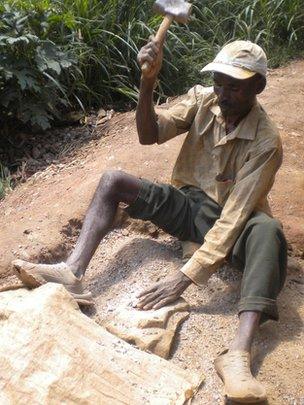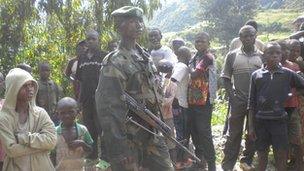DR Congo mining fights to revive reputation
- Published
Inside a tin mine in DR Congo
High in the mountains in eastern Democratic Republic of Congo, Fidele Yalala, carrying his tools in a sack, climbs down a slippery steep hillside.
Below him lies the opening of the Kilimbi Shaft at Nyabibwe mine. He turns on his headlamp and enters.
Other miners follow through dripping water, their heads bent below the roof of the dark, narrow tunnel shored up by timber struts.
At the rock face, Mr Yalala sets to work, hacking tin from the mountain with the most basic of tools.
"It's hard work," he says.
"We only use what we have - a torch, a hammer and a spike. We dug this tunnel with our own hands."
He has no helmet or gloves. The air is thick with dust. But at least down here there is no war and no violence.
Conflict, slave and child labour

The work is hard and the tools are basic for DR Congo's miners
In the heat outside, the dangers have at times been much greater than those inside the mines.
This part of Africa has been blighted by ethnic wars for decades. Millions have died.
Much of the violence has been financed with profits from the mining of metals such as tin, coltan, tantalum and gold - all used in electronic appliances.
To this day, different militia often control the mines, selling the minerals into the global supply chain.
Electronic companies, which can trace the origins of most of their materials, concede they cannot guarantee that their products are not tainted with conflict, slave or child labour.
Fidel Bafilemba from the campaigning group the Enough Project says that is not good enough.
"It is not a case that the minerals <italic>could</italic> have come from here," he says.
"They do indeed come from here."
Global intervention
Mr Bafilemba points to parts of a laptop, a mobile phone and a wi-fi router spread out on a table in front of him.
They all contain the key minerals. He points to gold - a resilient conductor of electricity - which shows clearly in the connecting prongs of a laptop hard drive.
"Where the mineral should be a source of wealth and of wellbeing, it is a curse," he says.
"It is a source of death in this country and that's why everybody who's human should say: 'No, we're going to put an end to this.'"
That is exactly what might be happening.
In the United States, a new law - section 1502 of the Dodd-Frank legislation - demands that any company that might be using conflict minerals register with the Securities and Exchange Commission.
In Europe, meanwhile, the 34-nation Organisation for Economic Co-operation and Development has been meeting to tighten guidelines on dealing with conflict minerals.

DR Congo has suffered for decades during a number of ethnic wars
The Nyabibwe mine and its community have become a test case - and it is hurting.
Known locally as the Obama law, the Dodd-Frank legislation has prompted big American and European buyers of tin to pull out rather than register and be tainted by the stigma of conflict minerals.
"The price has gone down, and I haven't been paid," says Nambibwe tin trader Kubisibwa Shihi.
"We are having a price imposed on us that has nothing to do with the world price."
The company that owes Mr Shishi money is run by Cirimwami Benjamen, in the regional capital Bukavu.
It is only about 50 miles away, but the roads here are appalling so it is a four-hour drive.
In Mr Benjamen's run-down yard stand lines of blue drums filled with tin, waiting to be sold.
"The Americans just stopped buying," says Mr Benjamen.
"We have debts and we owe money. Now we've found a Chinese company that might buy our stock."
'Boycott is working'
Regulations drawn up thousands of miles away are having a dramatic effect on lives here.
Albert Mulikuza, the Congolese government official pushing through the policy, concedes that "people are suffering from the boycott", but insists it is necessary.
"The time of war and suffering is now at the beginning of its end," he says.
Mr Bafilemba, from the Enough Project, agrees. He describes the situation as a "boycott that is working".
But the tin industry's own pressure group, ITRI, disagrees.
ITRI says it does not "generally support the imposition of trade restrictions".
And it insists that such measures are "unlikely to modify the practices that are of concern and are likely to disadvantage those who the actions seek to protect".
Meanwhile, the London-based World Gold Council is working towards implementing a conflict-free gold standard.
Damaged reputation
The mine in Nyambibwe is one of the few that has been certified as "green", which means it is not controlled or owned by military or rebel armed groups, and there are no children working here.
"Be sure, this is a green mine," says miner Mr Yalala, like a salesman, his face caked with the grit of the mine shaft.
"You can see it is clean so people can come and start buying minerals from this mine again."
But will they?
Technically, the transparency around the mine means tin extracted from it can legally enter the global supply chain.
Yet even here in this mine, the miners are still working in conditions that many say are appalling. Elsewhere, many others, particularly those producing gold, are failing certification.
The United Nations, Western governments and activists agree that much more has to be done to revive the damaged reputation of DR Congo's mineral wealth extraction.